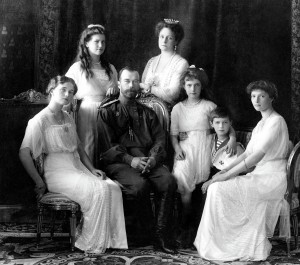After over three hundred years of Russian rule by the Romanov Dynasty, Tsar Nicholas II abdicated his throne in March of 1917. The Russian leader was facing popular unrest over an enormous wealth gap and then chose to thrust his nation into an expensive and bloody war against Germany. Nicholas’ rule had experienced an uprising in 1905 which persuaded him to call a supposedly representative body known as a Duma, but the Tsar’s refusal to accept any of the body’s proposals only fueled discontent among the people. By 1917, Nicholas “recognized that it [was] for the good of the country that [he] should abdicate the Crown of the Russian State and lay down the Supreme Power.” ((Abdication of Nikolai II)) The Tsar blamed the domestic strife for further stunting the war efforts, but he claimed that “the moment [was] near when our valiant Army, in concert with out glorious Allies, will finally overthrow the enemy.” ((Abdication of Nikolai II)) Despite his apparent optimism, he decided to leave the Crown to his brother Mikhail Alexandrovich, who was equally hesitant about shouldering the burden of the Russian State. Mikhail dubbed the power bestowed on him as a “heavy task” ((Declaration from the Throne by Grand Duke Mikhail)) and left control to a provisional government. He hoped to avoid further public outcry by promising the populace a role in deciding what type of government would next rule over Russia.
The First Provisional Government proposed a liberal set of guidelines in the wake of the Tsar’s downfall. The people the cabinet presided over were meant to have freedom of speech, relative freedom of religion, universal suffrage, the power to elect those who will hold office, and universal pardons for anyone accused of political crimes. ((The First Provisional Government)) It would not hold true to its promise of a direct vote for the constitution and form of government that would lead Russia. Multiple provisional governments would be established before the so called Bolshevik Revolution just a few months later in November of 1917. The Revolution was technically a bloodless coup, orchestrated by Vladimir Lenin who would hold power until his death.

